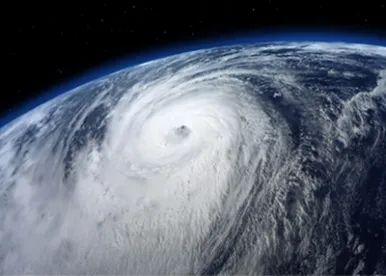Hurricane Ida reportedly was the third most powerful storm on record to hit Louisiana when it landed on August 29, 2021. Indeed, more than 590,000 homes and businesses across the region still were without power as of September 5th, according to news reports. The hurricane’s full economic impact may not be realized for months.
When natural disasters such as hurricanes hit, employers must be mindful of their responsibilities under state and federal law. With Louisiana as illustration, this article highlights nine critical points about compensation, communication, benefits, and leave employers should pay attention to after a disaster.
Know the rules that apply to nonexempt and exempt employees. The federal Fair Labor Standards Act (FLSA) requires employers to pay nonexempt (hourly) employees only for hours that employees actually worked. Employees must be compensated according to their regular wages for the days leading up to a natural disaster. However, employers are not required to pay nonexempt employees if the worksite is destroyed or unusable because of a disaster. More importantly, the FLSA does not allow employees to “volunteer” their services. Any work performed for the employer must be compensated.
An exception to the general rule for nonexempt employees applies to those who receive fixed salaries for fluctuating workweeks. Essentially, these are nonexempt employees who have agreed to work an unspecified number of hours for a specified salary. In these instances, employers must pay these employees their full weekly salary for any week in which any work was performed.
For exempt employees, an employer must pay the employee’s full salary if the business is closed or unable to reopen due to inclement weather or other disasters for less than a full workweek. An employer, however, may require exempt employees to use unpaid or accrued leave for this time. If the business is closed for the full workweek, an employer is not required to pay exempt employees for that week.
Pay employees on time. State laws vary and Louisiana law (La. R.S. 23:633) requires employers to pay employees on the first and 16th days of the month, unless the employer specifies different days at the outset of employment. If a disaster prevents payment, the employer must make payment as soon as practicable in order to limit potential liability. Employers may be liable for back pay, penalties, and attorney’s fees if they fail to pay employees on time. Direct deposit is a reliable means of paying employees without requiring them to show up to get paid. It also allows employers to ensure timely payments despite inclement weather. The U.S. Department of Labor (DOL), however, cautions employers that they cannot require direct deposit if banking fees will put the employee below minimum wage. Employers should ensure they follow the laws of the states in which they operate.
Encourage the filing of unemployment benefits. Eligible employees may file for unemployment benefits if they meet the eligibility requirements for the base period in Louisiana. The base period is the first four of the last five completed calendar quarters before the quarter in which the claim is effective. To receive unemployment benefits, the employee must have been paid at least $1,200 in total base period wages, and wages must have been earned in at least two of the four quarters in the base period.
Additionally, the Louisiana Disaster Unemployment Assistance (DUA) program is available to individuals whose employment was lost or interrupted due to a natural disaster, such as Hurricane Ida. The program is available in the 25 parishes in Louisiana affected by the storm. DUA is separate from standard unemployment benefits and is available only during a Disaster Assistance Period, which begins with the first Sunday following the date that the major disaster is declared. Other states may have similar programs.
Keep accurate timekeeping records. Accurate timesheets are essential when recovering from a disaster. Not only does this allow employees to receive correct and timely payment, it protects employers from potential liability under payday laws. Keeping electronic records may be challenging when the power is out, however. When this happens, employees may record all hours worked by handwritten timesheets or by other means (e.g., timekeeping apps or cloud-based time recording systems). Each workday, each employee should enter their own time and record the actual times when the employee’s work starts and stops.
If time records for work already performed are lost in a storm, recreating the most accurate accounting under the circumstances may be acceptable. Any recreation of lost time records should include the employee’s acknowledgment that they are using their best recollection, as well as the employee’s authorization for corrections once additional information becomes available.
Be mindful of special COBRA issues. For COBRA-covered health plans, the plan administrator must be notified if an employee is no longer eligible for coverage under an ongoing plan because the employee is not working. However, it is common after a disaster to lose touch with displaced employees, especially those who are not working because their employer’s business is destroyed. Likewise, regular mail delivery may not continue because of dangerous, unresolved conditions caused by a storm. COBRA still requires employers to mail notices and election forms to an employee’s last known address. To fulfill this requirement, employers should send COBRA notices to the employee’s last known physical address, as well as send electronic notices to any email addresses on file. Sending text messages to displaced employees encouraging them to update their contact information, even if it is on a temporary basis, also is an option.
Similarly, employers should notify employees if they relocate because of a storm and keep employees apprised of their new location. Employers should complete business forwarding forms with the U.S. Postal Service.
If an employer has not received a COBRA payment from a former employee, the law requires a 30-day grace period for such payments. This period may be extended because of a disaster. The extension is flexible, and the guiding principle is that employers must act reasonably, prudently, and in the interest of the former employees and their families who rely on their health plans for their physical well-being. Like other notices made after a natural disaster, employers also may send notices to the employee’s email address in addition to their last known physical address.
As with prior hurricane disasters, the DOL has indicated that plan fiduciaries should make reasonable accommodations in these special circumstances to prevent the loss of benefits due to the failure to respond to an election notice or payment demand. Any grace period extensions should be cleared with an employer’s insurer or stop loss provider.
Communicate regularly and frequently with employees. During chaotic times, it is important for employers to check in regularly with employees to the best extent possible. Check in regularly with employees to ensure they have what they need to complete their work and stay connected, both electronically and emotionally. Employers should be the voice of reason and a comforting source in such a critical time. The importance of conveying confidence, empathy, and security cannot be understated. Employees value businesses that are supportive, helpful, and empathetic.
Depending on how your company fared and the nature of your business, it may be helpful to update employees on changes in work hours and coverages several times a day. Keep in mind that outages after a storm may prevent normal communication, so using text messages, Twitter posts, and other social media outlets are helpful ways to keep employees in the loop. Messages with employees should cover such topics as:
-
Office hours for the days or weeks ahead (including modified or regular schedules)
-
How often employees should update their supervisor on their availability
-
Flexibility to work remotely or part-time (if the office is not available)
-
Whether their children may go into the office if school is out
Make proper WARN Act notifications. In areas totally devastated by a natural disaster, some businesses might not operate for extended periods of time. This may lead to plant closings or mass layoffs as businesses pick up the pieces. Generally, under the federal Worker Adjustment and Retraining Notification (WARN) Act, employers with at least 100 full-time employees must provide at least 60 days’ notice prior to closing a plant or mass layoffs. However, an exception applies when the closing or layoff is due to a natural disaster (20 CFR §639.9(c)(3)). Closings due to Hurricane Ida would apply this exception.
Despite this narrow exception, employers must still provide “as much notice as is practicable,” as well as a reason why the normal notification period was not followed. The devastation following a hurricane would justify the lack of immediate notice.
Proper WARN Act notifications must include:
-
Whether the planned action is expected to be permanent or temporary;
-
The expected date the plant closing or mass layoff will commence;
-
A statement of whether bumping rights exist; and
-
The name and phone number of a company official who can be reached for further information.
While the law suggests that sending written notice to employees’ last known address is reasonable, employers may take advantage of electronic means, such as email or text messaging, for the sake of expediency. This may be especially helpful for employees residing in the immediate path of a hurricane, who may be displaced and not receive written notice in the aftermath of the storm. Employers also must be mindful of any applicable state or local WARN-type notice requirements.
Use caution if penalizing post-disaster absences. If an employer is open for business after a disaster, absences caused by transportation difficulties experienced during weather emergencies could be deemed an absence for personal reasons under federal law. In these instances, an employer may place an exempt employee on leave without pay (or require the employee to use accrued vacation time) for the full day that the employee fails to report to work. If an employee is absent for one or more full days for personal reasons, the employee’s salaried status will not be affected if deductions are made from a salary for such absences.
However, employers may not deduct salary for less than a full day’s absence. Instead, an employer may make a partial day time deduction from the employee’s leave bank (if there is insufficient time in the leave bank, no deduction from salary can be made; however, the employer can deduct from future accrual). Employers may also establish leave sharing banks to allow employees who need such leave because of the storm. Further, employers may require exempt employees to “make up” lost time after they return to work. Such is not allowed for nonexempt employees, as they must be paid overtime for all hours worked over 40 in a workweek.
It is also possible that some employees may be called up by the National Guard or Reserves to help in recovery efforts after a storm. In this case, employers also must comply with the requirements of the Uniformed Services Employment and Reemployment Rights Act (USERRA). USERRA prohibits discharging, denying initial employment, denying promotion, or denying any benefit of employment because of a person’s membership, performance of service, or obligation to perform service in uniformed service. Employees on USERRA leave, at their option, may use available paid leave benefits to be paid for their time away from work. (Louisiana’s version of USERRA, La. R.S. 29:422, was adopted in the aftermath of 9/11.)
To be eligible for USERRA leave, an employee must:
-
Hold a civilian job and have a reasonable expectation that employment will continue indefinitely;
-
Provide advance written or verbal notice that they intend to leave for service or training. In emergency situations, or instances where it is unreasonable to provide advance notice, failure to do so is excused;
-
Engage in service that does not exceed the five-year cumulative limit; and
-
Submit a timely application for reemployment or report back for work in a timely fashion.
Louisiana law also has requirements for employees called to duty as “first responders,” including medical personnel, volunteer firefighters, emergency medical technicians, and auxiliary law enforcement officers who may be needed in search-and-rescue and recovery efforts. These employees are entitled to be placed on temporary leave and must be reinstated to their prior position once the employee reports back to work within a reasonable time from their release from first-responder duty. The same must apply if the employee was injured or became ill as a result of duties performed as a “first responder.” Such leave will be unpaid, but employees, with their employer’s permission, may use vacation, sick leave, and accrued compensatory leave during this term of service.
Be creative with financial support. In addition to leave banks, the federal Victims of Terrorism Tax Relief Act of 2001 states that employers may create a “tax-efficient” charitable fund to support employees affected by hurricanes and their families (i.e., an Employer Controlled Foundation). Created after 9/11, this type of fund allows employers to make tax deductible donations to the fund, and distributions are tax free to qualified employees. While this may be a noble way to support employees unable to work, unemployment benefits can be reduced by earned wages. Essentially, all payments to employees, including dismissal pay, vacation, or holiday pay, bonuses, and payments pursuant to the WARN Act may reduce unemployment benefits.






 />i
/>i

